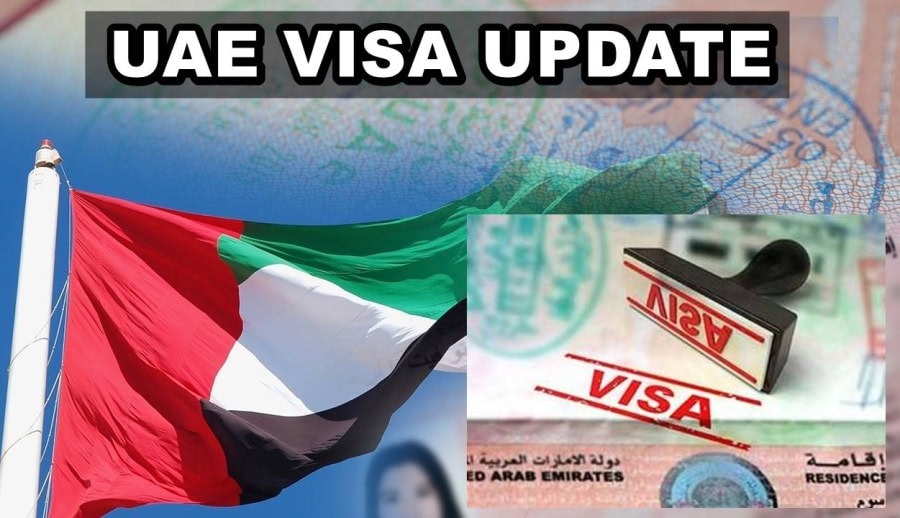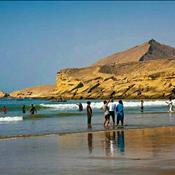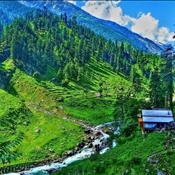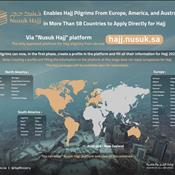
Every year, over 1.5 million Pakistanis visit the United Arab Emirates (UAE). It's a favorite spot for business, tourism, and family trips. But in late 2022, the UAE suddenly banned visas for Pakistani citizens. This left many wondering what was happening.
Now, it's important to know why this ban happened and when visas might start again. This will help everyone understand the situation better.

Key Takeaways
- The UAE's visa ban on Pakistani citizens has left many Pakistanis concerned about their travel plans.
- Understanding the historical context and potential reasons for the visa restrictions is essential.
- The impact of the visa ban extends beyond individual travelers, affecting businesses and the broader diplomatic relations between the UAE and Pakistan.
- Comparing visa policies between countries and exploring alternative travel destinations can provide valuable insights.
- Staying informed about official announcements and updates is crucial as the situation evolves.
Why UAE Has Banned Visas for Pakistan and When It Will Reopen
The United Arab Emirates (UAE) has stopped giving visas to people from Pakistan. This has caused a lot of worry and questions among Pakistanis. It's important to know why this happened and when visas might start again for those wanting to visit the UAE.
The UAE stopped giving visas to Pakistanis because of diplomatic and security considerations. The exact reasons are not clear, but it's thought that the UAE might be worried about security or people staying too long.
- The visa ban is part of the UAE's plan to make its immigration rules stricter and improve security.
- It could also be because of some diplomatic issues or disagreements between the UAE and Pakistan, but the details are still unknown.
The UAE hasn't said when they will start giving visas again. The situation is still changing, and the ban could be lifted when the problems are fixed.
"We are closely monitoring the situation and are in communication with the relevant authorities to understand the reasons behind the visa restrictions and the potential timeline for their reopening," said a spokesperson from trips.pk, a leading travel agency in Pakistan.
If you're from Pakistan and want to go to the UAE, keep an eye on any news about the visa ban. It's important to watch for updates from the UAE government and Pakistani authorities.
The UAE's decision to stop visas for Pakistanis has caused a lot of worry. But the reasons and when visas might start again are still unclear. Keeping in touch with the right people and staying updated on any policy changes is key for those planning to visit the UAE from Pakistan.
Understanding the UAE-Pakistan Visa Restrictions
To understand the visa restrictions between the UAE and Pakistan, we need to look at their history. This helps us see why recent changes might have happened.
Historical Context of the Diplomatic Relationship
The UAE and Pakistan have been friends for a long time. The UAE was one of the first to recognize Pakistan's freedom in 1947. They have worked together on trade, culture, and world issues.
But, their relationship is also complex. The UAE's role in the GCC and its ties with Saudi Arabia sometimes make things tricky. This affects their talks on security and global matters.
Potential Reasons for the Current Visa Ban
The UAE's new visa rules for Pakistanis have caused worry. The reasons are not fully clear, but experts have some ideas:
- Security concerns: The UAE might be worried about some Pakistanis using visas wrongly. So, they're checking more carefully.
- Economic considerations: The UAE might want to help its own people more in the job market. This could mean fewer visas for foreigners, like Pakistanis.
- Geopolitical tensions: The UAE's rivalries and alliances might also play a part. They want to keep their foreign relations balanced.
The visa ban isn't forever. The UAE says it might change or get better if they talk more.
Understanding the UAE-Pakistan visa rules is tricky. We need to know their history and the reasons behind the ban. As things change, Pakistanis should keep up and plan their travel wisely.
The Impact of the Visa Ban on Pakistanis
The UAE's decision to suspend visa issuance for Pakistani citizens has caused a big stir. It has affected individuals, families, and businesses greatly. Many Pakistanis are now facing uncertainty and frustration.
Travel plans have been disrupted for many. Those who had planned trips to the UAE have had to cancel or postpone. This has cost them a lot of money and has hurt the tourism and hospitality industries.
The visa ban has also affected personal and professional commitments. People working or studying in the UAE are facing problems. Pakistani businesses in the UAE are struggling to deal with the restrictions.
The ban has raised concerns about the future of the Pakistan-UAE relationship. Pakistanis are worried about when and how visa services will start again. They want clear answers.
It's important for Pakistanis to stay informed and look for other travel options. Travel agencies like trips.pk can help guide them through these tough times.
Gulf Country Travel Advisory: Implications for Pakistani Citizens
The UAE visa ban has big implications for travel to other Gulf countries for Pakistani citizens. It's important to stay updated on travel restrictions. Look for alternative destinations that are open to you.
Alternative Travel Destinations for Pakistanis
Even with the UAE visa ban, there are many places to visit. Consider these options:
- Oman: It's known for its beauty, culture, and friendly people. Oman is a favorite among Pakistani travelers.
- Qatar: It has modern cities, vibrant culture, and unique experiences. Qatar is a great choice for a Gulf adventure.
- Kuwait: This small Gulf nation has diverse landscapes. From the busy capital to the quiet desert, Kuwait is a good option for tourists.
Some might also look at places outside the Gulf, like Turkey, Malaysia, or Sri Lanka. These offer different cultures and travel experiences.
It's key to keep up with the gulf country travel advisory and visa rules. Talking to a trusted travel agency like trips.pk can make your trip smooth and fun.
"The world is a book, and those who do not travel read only a page." - Saint Augustine
Pakistan-UAE Diplomatic Relations: Past and Present
The relationship between Pakistan and the UAE is very important. They have a long history together, with both good times and tough times. Understanding their past and present is key to seeing how they work together.
Historical Foundations
The UAE and Pakistan started talking in the 1970s. Back then, the UAE was new. They quickly became friends, seeing the value in working together.
Over time, the UAE became a big partner for Pakistan. They help each other in many ways, like in trade and defense.
Areas of Cooperation
Pakistan and the UAE work together in many areas. They have agreements on trade, investment, and defense. They also help each other in energy, building projects, and fighting terrorism.
The UAE also invests a lot in Pakistan. This helps Pakistan grow. Plus, many Pakistanis live and work in the UAE, making their bond ber.
Navigating Occasional Tensions
Even though they are friends, Pakistan and the UAE sometimes disagree. Recently, the UAE put new rules on Pakistani visitors. But they are working to solve these problems.
Despite these issues, their friendship is b. They keep looking for new ways to help each other.
|
Key Milestones in Pakistan-UAE Diplomatic Relations |
Area of Cooperation |
|
Establishment of formal diplomatic ties in the 1970s |
Trade and investment |
|
Signing of numerous economic and security agreements |
Energy and infrastructure |
|
UAE's role as a major source of FDI in Pakistan |
Counter-terrorism efforts |
|
Presence of a large Pakistani expatriate community in the UAE |
Cultural and social exchange |
Now, Pakistan and the UAE need to keep talking and understanding each other. This will help them grow closer and help their people and the region.
Visa Policies Between Countries: A Comparative Analysis
International travel is shaped by visa policies between countries. These policies affect how easy it is to cross borders. For Pakistani citizens, understanding these policies is key to moving around the world.
Exploring Visa Reciprocity and Bilateral Agreements
Visa reciprocity is a key concept. It means countries give the same visa rights to each other's citizens. For example, if Pakistan requires a visa for a country, that country's citizens must also get a visa for Pakistan.
Bilateral agreements shape how people move between countries. They detail visa needs, application steps, and any special rules. Looking at these policies helps us see the diplomatic ties and travel ease for Pakistani citizens.
|
Country |
Visa Requirements for Pakistani Citizens |
Visa Reciprocity |
|
United Arab Emirates |
Visa required, with recent ban for certain categories |
Reciprocal visa requirements for UAE citizens |
|
Saudi Arabia |
Visa required, with exceptions for specific purposes |
Reciprocal visa requirements for Saudi citizens |
|
United States |
Visa required, with specific categories eligible for visa-free travel |
Reciprocal visa requirements for U.S. citizens |
Studying visa policies helps us understand travel ease for Pakistani citizens. This knowledge aids in making travel decisions and navigating the complex world of international travel.
"Visa policies are not just bureaucratic formalities, but rather reflections of the diplomatic and economic relationships between nations."
Temporary Visa Suspension: A Common Practice?
The UAE's decision to suspend visas for Pakistanis has raised many questions. People wonder if this is a common thing countries do.
Visa rules are complex and differ greatly between countries. Governments might limit visas for many reasons. This includes security, economy, or diplomatic issues.
- Many countries have used temporary visa bans before.
- They often do this due to security, immigration, or diplomatic reasons.
- How long these bans last can vary a lot, from weeks to years.
It's key to understand that these bans have complex reasons. They involve politics, economy, and society. Governments use them to tackle specific issues or to get what they want in talks.
"Temporary visa suspensions are not rare in international travel and diplomacy. They help governments deal with urgent matters or keep power in talks."
The UAE's move to stop visas for Pakistanis is not alone. Temporary visa suspension is something many countries do for their own reasons.

Travelers, especially Pakistanis, should keep up with visa news. Talking to trusted travel agencies, like trips.pk, can help a lot. They offer useful advice on visa rules that change often.
Resuming Visa Issuance: Potential Timeline and Conditions
The UAE-Pakistan visa ban is a big topic right now. Many Pakistanis are waiting to hear when visa applications might start again. The exact timeline is still unknown, but a few things could help decide when it happens.
Monitoring Official Announcements and Updates
To keep up with the latest news, it's important to watch official announcements. Pakistanis should check the UAE Embassy in Pakistan's website and social media. They should also look at the Ministry of Foreign Affairs and Ministry of Interior for updates on the visa ban.
Travel agencies like trips.pk can also offer useful insights. They provide real-time information on visa changes. By following these sources, Pakistanis can better understand the resuming visa issuance timeline and monitoring official announcements and updates.
|
Potential Factors Influencing Visa Resumption |
Possible Timeline |
|
Diplomatic negotiations and bilateral agreements |
6-12 months |
|
Improvements in security and immigration compliance |
3-6 months |
|
Economic and trade considerations |
9-18 months |
The timeline for visa applications to start again might change. It will depend on many factors like politics, economy, and security. Pakistanis should stay patient and keep an eye on the situation.
"The key to navigating the visa ban is to stay informed and proactive. By closely following official channels and trusted travel agencies, Pakistanis can be better prepared for the eventual reopening of the visa application process."
The Role of Travel Agencies in Navigating the Ban
Travel agencies have become key helpers for Pakistani citizens facing the UAE's visa ban. Companies like trips.pk offer detailed services and advice. They aim to help you get past the visa hurdles.
Services Offered by trips.pk
Trips.pk is a top travel agency in Pakistan. They know how the visa ban is affecting you. They provide services to ease your travel worries.
They help with new travel plans and keep you updated on visa rules. trips.pk wants your travel to be smooth and worry-free.
If you're looking for new places to visit or ways to avoid the visa ban, trips.pk is here to help. Their travel experts know the latest on diplomatic changes. They use their connections to give you the best advice.
Frequently Asked Questions
What are the reasons behind the UAE's decision to ban visas for Pakistani citizens?
The UAE's decision to stop issuing visas to Pakistanis is complex. It might be due to immigration, security, or diplomatic issues. The exact reasons are not clear, but experts think it could be related to these areas.
When will the UAE reopen visa applications for Pakistanis?
It's hard to say when the UAE will start issuing visas to Pakistanis again. The ban is still in place, and there's no word from the UAE on when it will end. Diplomatic talks are ongoing, so the situation might change soon.
What is the historical context of the diplomatic relationship between the UAE and Pakistan?
The UAE and Pakistan have a b relationship based on cooperation. They work together on economic, political, and cultural projects. But, there have been times of tension, which might have led to the visa ban.
How has the visa ban impacted Pakistani citizens?
The visa ban has hit Pakistani citizens hard. It has ruined travel plans, split families, and hurt businesses. Many have lost money, had flights cancelled, and missed important events.
What are the implications of the visa ban for Pakistani travelers seeking to visit other Gulf countries?
The UAE's ban might affect travel to other Gulf countries. Each country has its own visa rules. Pakistani travelers might need to look into other options or visa requirements for Gulf nations.
How do visa policies and reciprocity agreements between countries influence diplomatic relations?
Visa policies and reciprocity are key in diplomatic relations. Restrictions or denials can send diplomatic signals. The balance of visa rules and fairness are crucial for good diplomatic ties.
Is the temporary suspension of visas a common practice among countries?
Yes, countries sometimes suspend visas temporarily. Reasons vary, like security, immigration policy changes, or diplomatic tensions. It's a way to manage borders or apply diplomatic pressure.
How can Pakistani citizens stay informed about the potential reopening of the UAE visa application process?
Pakistani citizens should keep an eye on official announcements from the UAE and Pakistan. Check the UAE's relevant websites and the Pakistani Ministry of Foreign Affairs for updates on visa resumption.
How can travel agencies assist Pakistanis in navigating the visa ban?
Travel agencies, like trips.pk, can help a lot. They provide the latest visa news, suggest other travel options, and help with flight and accommodation changes. They also look for workarounds or exceptions to the ban.
;More Travel News
-
 06-Jun-2023UAE Travel Restrictions 2023: Current List of Countries on the UAE Red List
06-Jun-2023UAE Travel Restrictions 2023: Current List of Countries on the UAE Red List -
 27-Nov-2021Best Beachs Tour Package in Pakistan
27-Nov-2021Best Beachs Tour Package in Pakistan -
 15-Apr-2022Umrah will Remain Open till 28th Shawwal 1443
15-Apr-2022Umrah will Remain Open till 28th Shawwal 1443 -
 21-Sep-2020Top 5 Amazing Places in Northern Areas of Pakistan That You Must Visit This Year?
21-Sep-2020Top 5 Amazing Places in Northern Areas of Pakistan That You Must Visit This Year? -
 10-Feb-2023Hajj Registrations for 58 Countries
10-Feb-2023Hajj Registrations for 58 Countries -
 26-Jan-2022Best Attractions to Visit in Turkey During Winter
26-Jan-2022Best Attractions to Visit in Turkey During Winter -
 16-Nov-2018Do you Wish to go from Pakistan to China by Bus?
16-Nov-2018Do you Wish to go from Pakistan to China by Bus? -
 25-Feb-2025Limited Offer! Ramadan 2025 Umrah Packages with Flights & Hotels – Book Now with Trips.pk
25-Feb-2025Limited Offer! Ramadan 2025 Umrah Packages with Flights & Hotels – Book Now with Trips.pk
